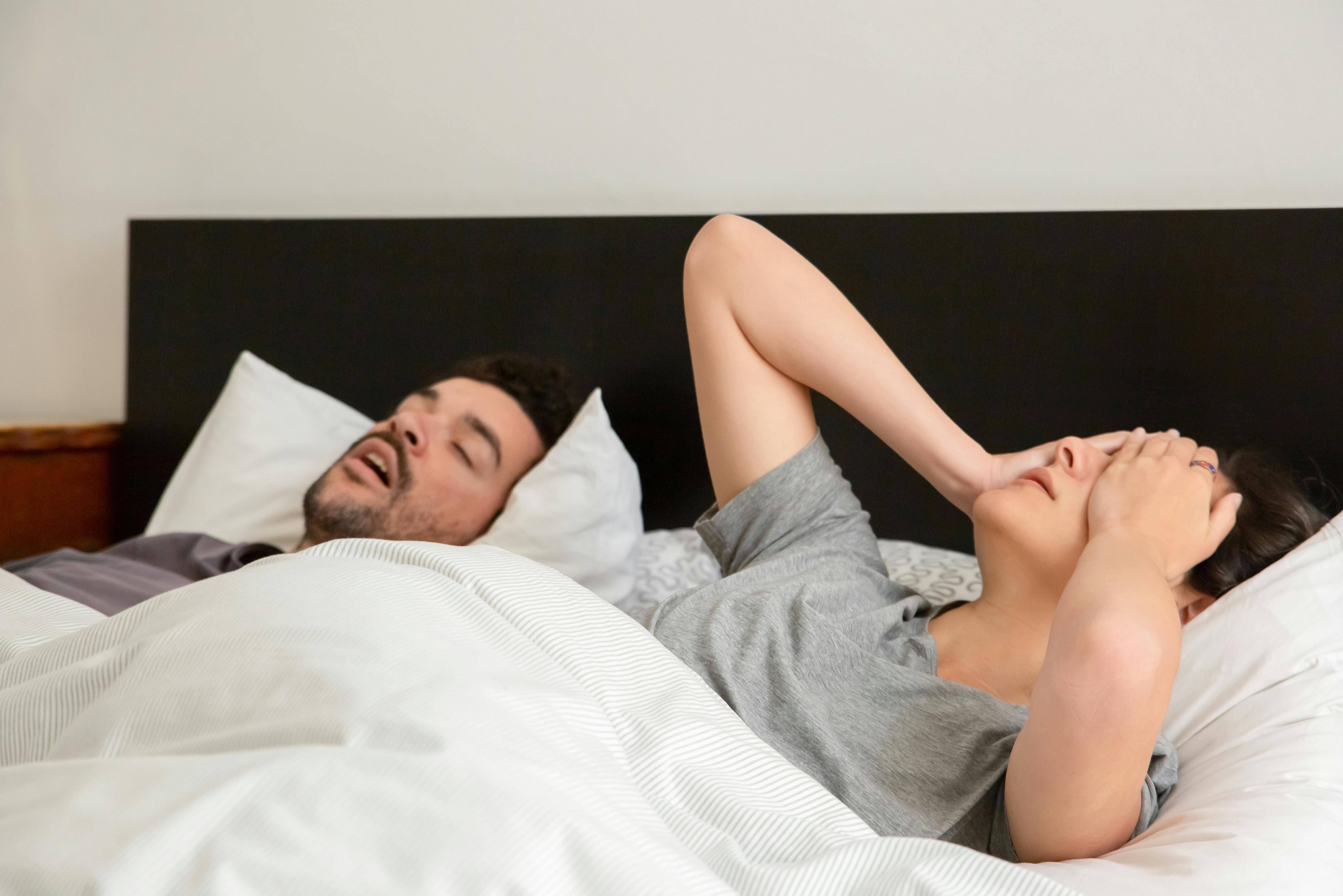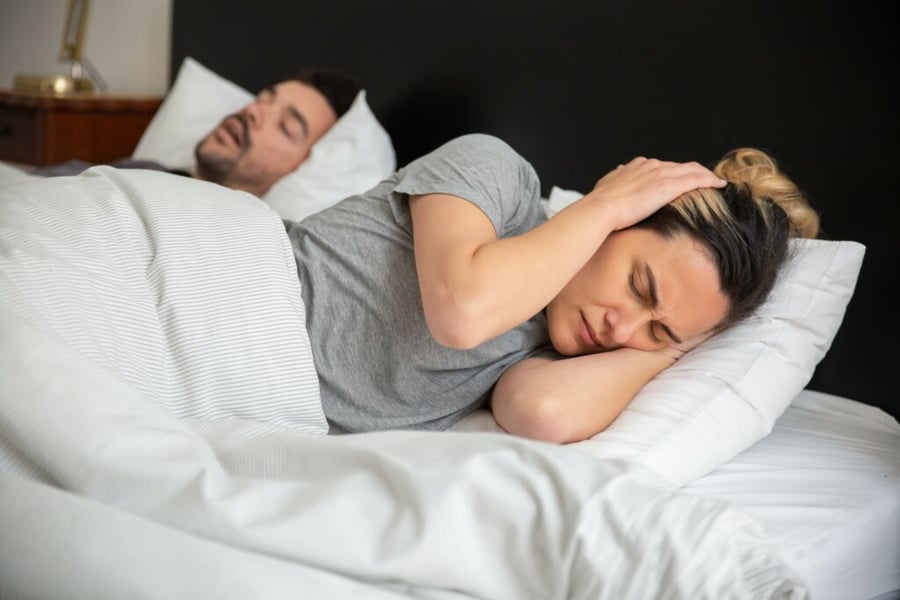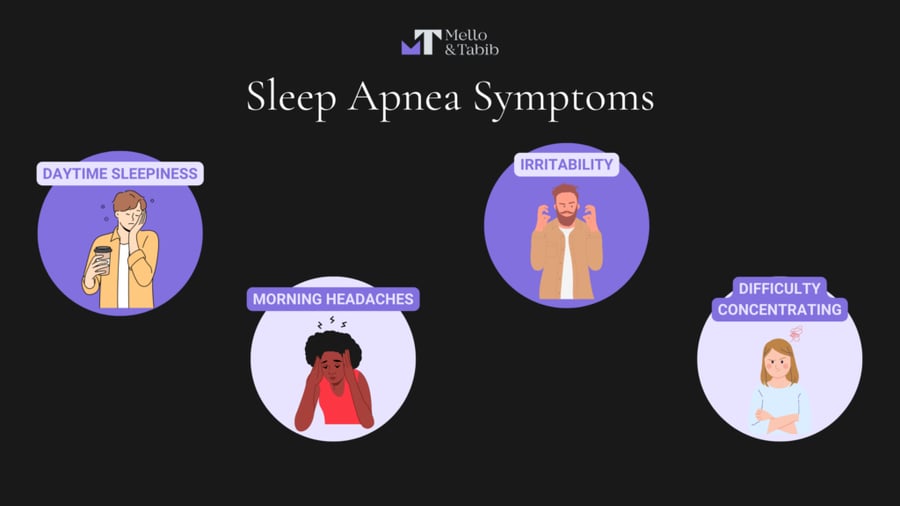
When it comes to nighttime disturbances, snoring is often the first thing that comes to mind. However, not all snoring is harmless.
At NYC Smile Design, we’ve encountered numerous patients who initially mistook their sleep apnea symptoms for mere snoring. This common confusion underscores the importance of understanding the distinction. It’s crucial to distinguish between benign snoring and sleep apnea, a more serious condition.
This article aims to educate readers about the differences between sleep apnea and snoring, and their potential health implications, and guide them toward appropriate steps for diagnosis and management.
What is Snoring?
Snoring occurs when the flow of air through the mouth and nose is physically obstructed during sleep. It’s a common condition that can affect anyone, although it occurs more frequently in men and people who are overweight. Snoring can be caused by various factors, including the anatomy of your mouth and sinuses, alcohol consumption, allergies, a cold, and your weight.

Understanding Sleep Apnea
Sleep apnea is a serious sleep disorder where breathing repeatedly stops and starts during sleep. The most common type is obstructive sleep apnea, where throat muscles intermittently relax and block the airway during sleep. Unlike snoring, sleep apnea is recognized as a medical condition that requires diagnosis and treatment due to its association with various health risks. Often the first sign of sleep apnea is picked up by a dentist- associated with grinding/clenching teeth and mouth breathing.
Key Differences Between Sleep Apnea and Snoring
While both sleep apnea and snoring involve breathing disruptions during sleep, there are key differences in their symptoms and implications:
- Snoring: Usually, snoring is characterized by loud, continuous noises during sleep. It may be accompanied by occasional tossing and turning.
- Sleep Apnea: This condition features notable symptoms like loud snoring followed by periods of silence when breathing stops or gasps when breathing starts again. Sleep apnea sufferers often experience excessive daytime sleepiness, morning headaches, irritability, and difficulty concentrating.

Health Implications
While snoring can disrupt a good night’s sleep, it’s often considered more of an annoyance rather than a critical health concern. However, this does not mean it should always be dismissed. In some cases, snoring can be an early sign of more serious conditions, such as sleep apnea. Typically, snoring on its own isn’t directly linked to severe health issues, but its presence, especially when loud and persistent, warrants attention. It’s important to monitor snoring patterns and consult with a healthcare professional if there are concerns about sleep quality or the possibility of underlying conditions.
Contrastingly, sleep apnea presents a more pressing health concern. This condition, if left untreated, has the potential to lead to a range of serious health problems. The intermittent breathing disruptions that characterize sleep apnea can cause fluctuating oxygen levels and disrupted sleep patterns, leading to long-term health consequences. Individuals with untreated sleep apnea are at an increased risk for high blood pressure, heart disease, and stroke. Additionally, the disorder can contribute to the development of diabetes and exacerbate mental health conditions like depression. The severity of these risks highlights the importance of early detection and effective management of sleep apnea.
Mouth breathing, often seen in individuals with sleep apnea and habitual snorers, can have significant implications for oral health. This habit often leads to dry mouth, a condition that accelerates plaque buildup, gingivitis, and eventually periodontal disease. A moist mouth with healthy salivary flow acts as a natural defense against these conditions, but mouth breathing disrupts this balance, leading to drier oral conditions and increased dental risks. Additionally, mouth breathing can alter dental structure; it changes the shape and width of the upper arch as the tongue does not press against the palate as it does during nose breathing. This lack of support from the tongue can lead to a constricted arch and subsequently crowded teeth. The lower arch also becomes affected, leading to inadequate space for the tongue. This spatial constraint not only exacerbates snoring but can also physically obstruct the airway and impact the jaw position, further complicating breathing difficulties and affecting overall oral health.
Diagnosis and Management
If you suspect you have sleep apnea, it’s important to consult with a healthcare professional. Diagnosis usually involves a sleep study that records various body functions during sleep.
Managing Snoring Through Lifestyle Changes
Effective management of snoring often begins with lifestyle modifications. One of the primary recommendations is weight loss, as excess body weight can contribute to the narrowing of the airway during sleep, exacerbating snoring. Similarly, avoiding alcohol before bedtime is crucial, as alcohol can relax the throat muscles, leading to increased obstruction and snoring. Another simple yet effective change is altering sleep positions. Sleeping on your back can cause the tongue and soft palate to collapse to the back of the throat, blocking the airway and causing snoring. Switching to a side-sleeping position may help reduce this risk. These lifestyle adjustments, while seemingly minor, can significantly improve the quality of sleep and reduce snoring for many individuals.
Addressing Sleep Apnea with Medical Interventions
While lifestyle changes are also beneficial for sleep apnea, this condition often requires more comprehensive medical interventions. One of the most common and effective treatments is the use of Continuous Positive Airway Pressure (CPAP) therapy. CPAP machines deliver a steady stream of air through a mask, keeping the airway open during sleep. For those who find CPAP therapy cumbersome or uncomfortable, dental devices designed to keep the airway open may be an alternative. These devices adjust the position of the lower jaw and tongue to improve airflow. In more severe cases of sleep apnea, surgery might be necessary. Surgical options vary, but they generally aim to remove or reduce tissue in the throat or reposition the jaw to enlarge the airway. These medical interventions are critical for preventing the serious health complications associated with untreated sleep apnea.
The Cost of Treating Sleep Apnea: A Crucial Consideration
When considering the treatment for sleep apnea, understanding the associated costs is an important factor in making informed healthcare decisions. The financial aspect of treating sleep apnea can vary widely, depending on the severity of the condition and the type of treatment required.
Factors Influencing the Cost
- Type of Treatment: The cost can differ significantly based on the treatment method. Options like CPAP machines, dental appliances, and surgical interventions each have different price points. CPAP machines are a common and effective treatment, but the cost can vary based on the machine’s features and the need for regular replacement of parts. Dental appliances, typically custom-made, can also vary in price. Surgical options, while more expensive, are usually considered for severe cases or when other treatments have failed.
- Insurance Coverage: Health insurance plays a crucial role in determining the out-of-pocket cost for patients. Coverage for sleep apnea treatment can vary between insurance providers and plans. It’s essential to check with your insurance provider to understand what aspects of the treatment are covered and what your financial responsibility will be.
- Ongoing Costs: Apart from the initial treatment costs, there are ongoing expenses to consider, such as replacement of CPAP machine filters, masks, or maintenance of dental devices. These recurring costs can add up over time.
Why Understanding the Difference Matters
Recognizing the difference between sleep apnea and snoring is crucial for your health and well-being. If you’re just snoring, simple lifestyle changes may improve your sleep. However, if you have sleep apnea, seeking professional help is essential to prevent serious health issues. Always consult with a healthcare professional to get the right diagnosis and treatment plan.
Understanding these differences empowers you to take the appropriate steps toward better health and quality sleep. Remember, a good night’s sleep isn’t just about silence; it’s about safety and health too.
For more information, visit our page on sleep apnea to reassure your sleep concerns. Our team of experts is committed to helping you achieve the best possible sleep health and overall well-being.
Topics:

